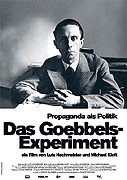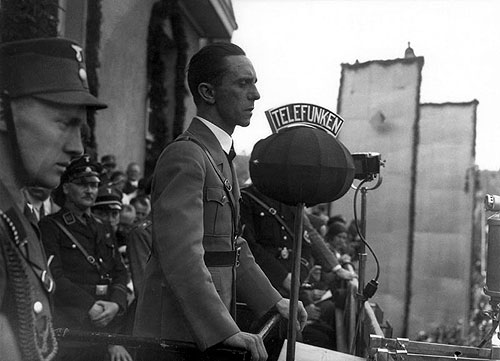Director:
Lutz HachmeisterMúsica:
Hubert BittmanReparto:
Kenneth Branagh (narrador), Udo Samel (narrador), Harry Giese, Joseph Goebbels (arch.), Hermann Göring (arch.), Max Schmeling (arch.), Joe Louis (arch.) (más)Sinopsis(1)
An intimate look at the mind of the master propagandist Joseph Goebbels, who shaped German popular opinion throughout the Nazi rise to power and subsequent fall, THE GOEBBELS EXPERIMENT unfolds through diary excerpts spanning the years between 1924 until Goebbels's grisly death at the close of WWII. Narrated by Kenneth Branagh, the text is accompanied by archival photographs and early films taken from the period, and includes many instances of Goebbels himself at the podium, such as his famous "Total War" speech. More interesting is the insight into the evolution and inner workings of Goebbels's character. He tells of his early illnesses, which left him paralyzed, and a youth that "held little joy." Diminutive, clubfooted, and deeply pessimistic, he describes his early literary pursuits, reading Mann and Dostoevski, and the unhappiness and loathing he experienced while working in a bank in Cologne. Searching for meaning in his life, he finds purpose in the Third Reich, and pledges utter devotion to Hitler. Later, this unqualified adoration is beset with paranoia and petty squabbles, and the inner sanctum of the Nazi party is shown from Goebbels's perspective to be a bickering clique of ladder climbers. Goebbels's personal life is equally fraught, as he remains painfully single until he enters his 30s, and then becomes an unqualified womanizer. (texto oficial de la distribuidora)
(más)Reseñas (1)
Accounts from the diary of the greatest quack in German history, accompanied by film footage from the time. Of particular interest are his emotional state in relation to women, his undisguised hatred of Himmler and his comments on German and Hollywood cinema. It's just a shame that there's virtually nothing of the mental motivations of the last weeks of his life (his decision to commit mass family suicide); that could have been the highlight of the entire 2-part documentary.
()

